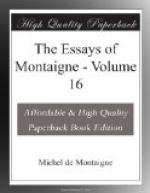The other king of Mexico,—[Guatimosin]—having for a long time defended his beleaguered city, and having in this siege manifested the utmost of what suffering and perseverance can do, if ever prince and people did, and his misfortune having delivered him alive into his enemies’ hands, upon articles of being treated like a king, neither did he in his captivity discover anything unworthy of that title. His enemies, after their victory, not finding so much gold as they expected, when they had searched and rifled with their utmost diligence, they went about to procure discoveries by the most cruel torments they could invent upon the prisoners they had taken: but having profited nothing by these, their courage being greater than their torments, they arrived at last to such a degree of fury, as, contrary to their faith and the law of nations, to condemn the king himself, and one of the principal noblemen of his court, to the rack, in the presence of one another. This lord, finding himself overcome with pain, being environed with burning coals, pitifully turned his dying eyes towards his master, as it were to ask him pardon that he was able to endure no more; whereupon the king, darting at him a fierce and severe look, as reproaching his cowardice and pusillanimity, with a harsh and constant voice said to him thus only: “And what dost thou think I suffer? am I in a bath? am I more at ease than thou?” Whereupon the other immediately quailed under the torment and died upon the spot. The king, half roasted, was carried thence; not so much out of pity (for what compassion ever touched so barbarous souls, who, upon the doubtful information of some vessel of gold to be made a prey of, caused not only a man, but a king, so great in fortune and desert, to be broiled before their eyes), but because his constancy rendered their cruelty still more shameful. They afterwards hanged him for having nobly attempted to deliver himself by arms from so long a captivity and subjection, and he died with a courage becoming so magnanimous a prince.




